Archive for the 'bookmaggot' Category
Tuesday, February 17th, 2015
The water in the glass he sipped from trembled; but still he gave off that little buzz of glamour peculiar to the Australian tradie
Crop-haired and wiry in her dark blue uniform, a huge diver’s watch on her wrist, Senior Constable Rebecca Caskey of the Search and Rescue Squad stood in the witness stand with her hands clasped loosely behind her. Something in her easy posture reminded me of nurses I had seen at work: women of few words, unflappable, alert and calm.
His responses were so inadequate to the gravity of the situation that it hurt to look at him.
Oh, how bleak and windswept it seems to women, the landscape of what some men call friendship.
Posted in australia, bookmaggot, grief, women are human, words | Comments Off on this house of grief, by helen garner
Sunday, February 15th, 2015
“It must’ve been so beautiful” is the inevitable reply. “It was,” he tells them, “it is,” and then finds a way to change the subject because it’s difficult to explain this next part. Yes, it was beautiful. It was the most beautiful place I have ever seen. It was gorgeous and claustrophobic. I loved it and I always wanted to escape.
In art school they talked about day jobs in tones of horror. She never would have imagined that her day job would be the calmest and least cluttered part of her life.
Perhaps soon humanity would simply flicker out, but Kirsten found this thought more peaceful than sad. So many species had appeared and later vanished from this earth; what was one more?
like the corporate world’s full of ghosts. And actually, let me revise that, my parents are in academia so I’ve had front-row seats for that horror show, I know academia’s no different, so maybe a fairer way of putting this would be to say that adulthood’s full of ghosts.”
“I just mean, my life must’ve seemed unfathomable to him.” “Your life’s probably unfathomable to most people.
Posted in bookmaggot, grief | Comments Off on station eleven, by emily mandel
Friday, February 13th, 2015
“Sometimes holding all the blackness they feel is the only thing you can do. That’s not nothing. And sometimes it is enough.”
I question my intuition rigorously and routinely, but I rely upon it nonetheless.
Don’t just do something, stand there.
If I am to abide with these patients, then I must accompany them to that place among the rocks, to the sweating wall. I must face with them the uncertainty of what lies beyond. I must stand at the edge with them and peer over into the fathomless depths. If I tell my patients, as I do, that this life can be a tolerable one, that they can face their fears and their traumas, their visions and voices, their misery, then I must look at what I am asking them to endure and I must look at it full in the face.
How do we do it? How do we bear the unbearable realities of our human lives? Someday I will die and leave Deborah, and our son, and our daughter. Or someday each of them will die and leave me. How do we reckon with this inconceivable a loss?
Posted in bookmaggot, grief, hope, meta, mindfulness, women are human, words, worldchanging | Comments Off on falling into the fire, by christine montross
Wednesday, December 24th, 2014
“Did he suffer?” I hate that question. Survivors of the deceased ask it all the time. If the answer is no, I’ll tell them the truth. If the answer is yes—sometimes I will lie.
I ran into Dr. Hirsch in the hallway. He was cleaned up, but had several raw abrasions on his forehead. He looked worn and tired, and was limping. His right elbow was covered with a gauze bandage. I had never seen Hirsch rattled by anything, and now he seemed so suddenly fragile, this brilliant man, this great leader. I wanted to hug him but was afraid to hurt him, so I held out my hands. He placed his fingers in mine, and I rubbed them, then turned his hands over. The knuckles were bruised, scratched, and dirty. “See these contusions?” Dr. Hirsch asked, in the same tone of professional remove he employed at morning morgue rounds. “They are from a man hunched and covering his head.” He demonstrated, and when he did, looked very old and scared. Then, without another word, he walked away. I couldn’t tell whether Charles Hirsch was making a teaching point or confiding in me. Or both.
Posted in bookmaggot | Comments Off on working stiff, by judy melinek
Tuesday, December 23rd, 2014
I read about 120 books this year, down from 150 in a normal year, which is not to say that I got less solace from reading. What did happen is that I read in different, maybe more intense ways. There were a few books I read over and over, until I had them almost by heart (Feather’s Your Blue Eyed Boys, Ann Leckie’s Imperial Radch, which I read and reread and then listened to on audiobook.) There were a few books, and I’m sure this is difficult to believe but it’s the truth, that I found so physically exhausting to confront that I would read a page or two and then have to sleep for a while (The Boy Who Was Raised as a Dog, Achilles in Vietnam and Trauma and Recovery.) I got through those mostly on Saturday afternoons. Boy do I know how to party.
There were other things as well that meant as much to me as books, which is rare. In the days and weeks immediately after Mum died, Cabin Pressure and Brooklyn Nine Nine were pretty much the only things that could make me laugh. I had The National’s album High Violet and Vienna Teng’s Aims on constant rotation all year. Lorde’s cover of “Everybody Wants to Rule the World” was everything, including the source of this post’s title. Richard Linklater’s Boyhood is the best film I saw this year but Captain America: The Winter Soldier is the one that meant most to me, even if it only meant it perversely, as mere backdrop to Feather’s universe.
In general I would say that everything in my reading life got a lot more complicated, including the question of what, exactly, a book is. If I listen to it, is it still a book? Sure. What about if it’s Pema Chodron or Amy Poehler, and she’s reading it to me herself? Still a book. What about if I’m listening to Cabin Pressure or Serial? Not books. Why? Because they use multiple voices. Uhh, but Amy Poehler has Patrick Stewart and her parents read parts of her book. Huh. Well, if I read it on my Kindle it’s definitely a book, right? Sure, unless it’s fanfic. Which is the case with the best book I read all year. Now available as a podcast.
That technically-mediated fucking-up of formerly orderly shit could not be more thematically appropriate, as it happens. This was my cyborg year. I acknowledged a debt of gratitude to Mum’s kindly machines. I realized with something of a cold shock just how rapidly my career accelerated after I got an IUD and stopped losing a week a month to the pain and debility of having a period. I nicknamed the Teng album “Soundtracks for Space Operas” and, crucially, I saw myself in Feather’s Bucky and Leckie’s Breq.
None of this should have been as surprising to me as it was. This blog was named for another very Breq-like character, the protagonist of Greg Egan’s Diaspora. When I named it, though, I thought I was naming something other than myself; a software person, not me. Liz was the first friend to call me Yatima. Lots of people call me that now. It means orphan, and it’s something I am becoming (something we all become.) I’m part flesh and part metal, with an outboard memory humming on a distant box. I’m exiled from the past (which in my case is literally another country.) Damned if I can explain the mechanism, but Yatima, the software orphan, is now the means by which I call my future self into being.
Posted in bookmaggot, fulishness, grief, meta, mindfulness | Comments Off on turn your back on mother nature: my cyborg year
Tuesday, December 2nd, 2014
Your competence gives you a secure sense of identity.
By age eighty-five, working memory and judgment are sufficiently impaired that 40 percent of us have textbook dementia.
More than half of the very old now live without a spouse and we have fewer children than ever before, yet we give virtually no thought to how we will live out our later years alone.
People with serious illness have priorities besides simply prolonging their lives. Surveys find that their top concerns include avoiding suffering, strengthening relationships with family and friends, being mentally aware, not being a burden on others, and achieving a sense that their life is complete.
…those who saw a palliative care specialist stopped chemotherapy sooner, entered hospice far earlier, experienced less suffering at the end of their lives—and they lived 25 percent longer. In other words, our decision making in medicine has failed so spectacularly that we have reached the point of actively inflicting harm on patients rather than confronting the subject of mortality. If end-of-life discussions were an experimental drug, the FDA would approve…
The patient and the family opted for hospice. They had more than a month together before he died. Later, the father thanked the doctor. That last month, he said, the family simply focused on being together, and it proved to be the most meaningful time they’d ever spent.
No one ever really has control. Physics and biology and accident ultimately have their way in our lives. But the point is that we are not helpless either. Courage is the strength to recognize both realities. We have room to act, to shape our stories, though as time goes on it is within narrower and narrower confines.
Posted in bookmaggot, grief, hope, mindfulness | Comments Off on being mortal, by atul gawande
Monday, December 1st, 2014
I needed something from the world I didn’t know how to ask for. I needed people—Dave, a doctor, anyone—to deliver my feelings back to me in a form that was legible.
The insistence upon an external agent of damage implies an imagining of the self as a unified entity, a collection of physical, mental, spiritual components all serving the good of some Gestalt whole—the being itself. When really, the self—at least, as I’ve experienced mine—is much more discordant and self-sabotaging, neither fully integrated nor consistently serving its own good.
“That’s so generous,” she said to me when I gave it to her—and of course I’d been hoping she would say that. I wanted to do nice things for everyone out of a sense of preemptive guilt
The great shame of your privilege is a hot blush the whole time. The truth of this place is infinite and irreducible, and self-reflexive anguish might feel like the only thing you can offer in return. It might be hard to hear anything above the clattering machinery of your guilt. Try to listen anyway.
A cry for attention is positioned as the ultimate crime, clutching or trivial—as if “attention” were inherently a selfish thing to want.
Posted in bookmaggot, history, hope, mindfulness, politics, words | Comments Off on the empathy exams, by leslie jamison
Sunday, November 30th, 2014
Trauma is bigger than expertise of any sort – it’s in our midst, in our language, our wars, even the ways we try to love, repeating, repeating. No one is an expert on trauma.
To read is to be drawn away from the confines of the body and the present moment into another time and place.
The poet Audre Lorde tells us that “poetry is the way we give name to the nameless so that it can be thought.”
Posted in bookmaggot, grief | Comments Off on the unsayable, by annie g. rogers, ph.d.
Saturday, November 29th, 2014
Just south of the Lions Park out of Manilla, NSW, someone has painted a bearded face on a tree.

It’s the first of eight such faces (that we know of), all taking advantage of the contours of the burls. The second one, named Toby by my nephew though it looks more like Gromit, is my favorite.
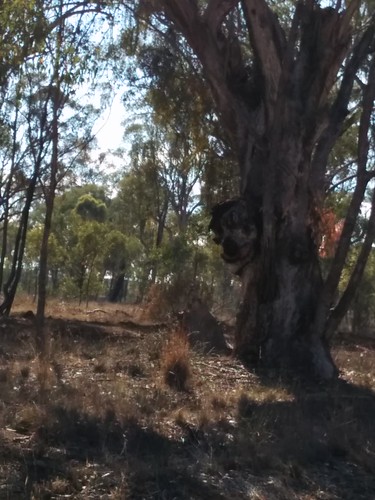
Before this trip to Barraba I tried to describe to myself the difference between my father’s town of a thousand souls and my own beloved city of San Francisco, population 800k but arguably way fewer souls. There are the giveaway jokes: Barraba used to have an asbestos mine, and just missed out on a new abattoir. In New York, everyone’s writing a novel; in LA, they’re working on a screenplay; in SF, they’re building an app.
That second joke gave me a clue. I love the density of narrative in cities, the plaques on London’s Georgian houses, the ghost of the railroad through the Mission, the undergrounded waterways. I thought for a while that Barraba is relatively empty of stories, until I remembered with a stab of sorrow that it used to be full of them, but that my ancestors tried to kill all the people that knew them.
Barraba is in Gamilaraay country. One story I do know is that of the Myall Creek Massacre.
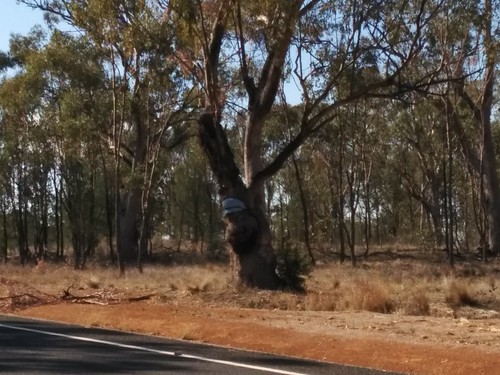
I’ve spent enough time in Barraba to have made good friends and learned a little of their stories. Pam has a great one about her husband Ted riding across a flooded creek to be with her when she had a baby; she remembers the sight of him galloping up to the house, surrounded by a halo of flies. Jane’s family owns a property called Wiry, which I had assumed was an Aboriginal name. Turns out it was part of the land grants to returned soliders, and because it’s a relatively hilly and inaccessible property, the recipient grumbled “Wouldn’t it root ya.” More giveaway jokes.
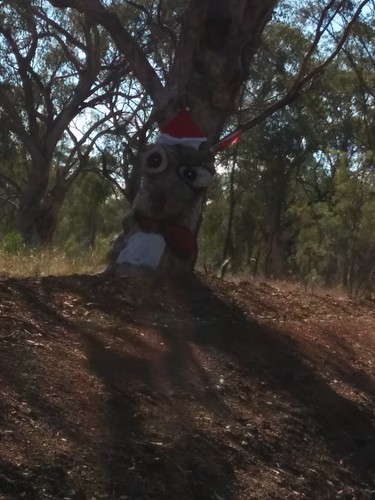
Jane asked me flat out what all seven of you remaining blog readers have probably been wondering: “Are you neglecting the blog because the stuff you’re thinking about is too intense and sad?” Yup. But something really terrific has happened. A researcher has become interested in Dad’s blog, which was critical to his diagnosis of semantic dementia. We have 17 years’ worth of his written records as his condition developed – more than five times the length of the next longest case study. Joanna believes we can extract psycholinguistic markers of the changes to his vocabulary that may help scientists to develop more sensitive diagnostic tests.
As part of collating the material for Joanna, I read a few of Dad’s earliest blog entries. He had a decent line in giveaway jokes of his own:
Tue 10 Feb 1998
Got away late from Sydney. Lasted on the road until 6 o’clock at which time we found ourselves in Gunning, between Goulburn and Gundagai.
Gunning is a town of a thousand souls and very few outstanding features.
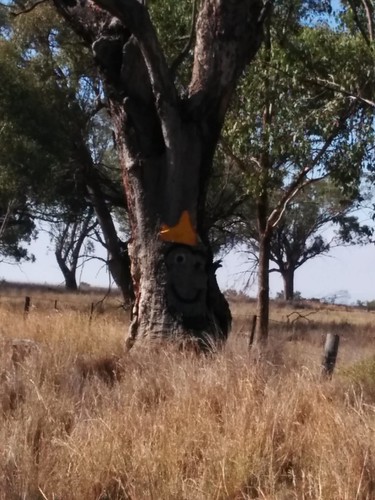
Death is the eater of meaning. It swallows up whole universes, erases stories from the landscape.
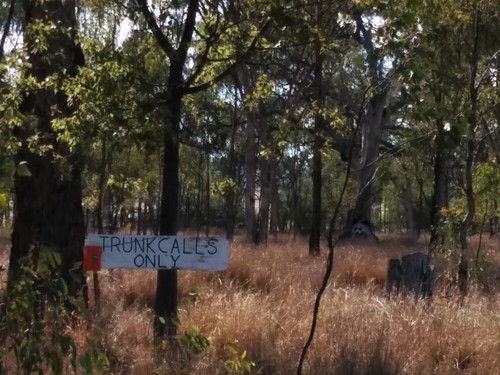
The work of grief is to make sense of loss. We have to make new narratives to mark the place of those that are gone.

We have to find the faces in the forest.
Posted in adventure time, australia, bookmaggot, grief, history, hope, mindfulness, politics, san francisco, sanity, words | Comments Off on the forest of faces
Saturday, April 26th, 2014
We’re back in the first person. Wilmet, the narrator of Glass, is the smuggest and most unpleasant of Pym’s heroines. I should confess to my own feelings of unpleasant smugness when she gets her (surprisingly progressive) comeuppance.
I’m hugely enjoying the continuity in the Pym universe. Wilmet is Archdeacon Hoccleve’s distant cousin. She and her friend Rowena knew Rocky Napier in Italy, and Wilmet’s husband Rodney has a dalliance with Prudence. Best of all, Rowena reads to Wilmet out of a magazine, and what she reads is Catherine Oliphant’s fictionalized account of the moussaka scene.
But the weirdest moment by far in Glass is when *I* show up in it.
I thought he might be a colonial, perhaps a New Zealander. I remembered clever moody passionate girls, like Katherine Mansfield, striving to break away from the narrowness of their environment, almost nineteenth century Russian in their yearnings, hating the traditional English Christmas in the middle of summer and the sentimental attitude toward the Mother Country.
Since women like me are represented in English literature with considerably less frequency than most breeds of dog, it always comes as a bit of a shock.
Austen parallel: Mansfield Park. (It’s “about ordination.”)
Dulcie, the protagonist of Fond, is a tragic figure because she lives in a world without Google. Her ability to Googlestalk before the fact is both impressive and creepy. She gets one of the best proposal-rejection scenes so far. I was starting to think that this novel took place outside the Pymiverse until Dulcie ran into Wilmet at a castle.
Austen parallel: Dulcie thinks she’s in Persuasion, but I think she’s in Northanger Abbey.
This marks the break in Pym’s career. She was bumped off the midlist after Fond and didn’t get anything published for another eighteen years. A good time for me to take a break too, I think.
Posted in bookmaggot, england | Comments Off on a glass of blessings/no fond return of love, by barbara pym
Sunday, April 13th, 2014
Sexy, independent Catherine Oliphant is the best Pym heroine so far. No frustrated literary yearnings for her: she writes romantic fiction for women’s magazines. Even as she catches her beloved in the act of having an intimate dinner with her replacement, she thinks to herself that their moussaka will be getting cold. She chooses her next crush on the basis of his resemblance to an Easter Island statue. I adore her.
The church takes a step back in this book and the vacuum is filled by anthropology. The resulting shabby-intellectual milieu is surprisingly reminiscent of Iris Murdoch.
Posted in bookmaggot, england | Comments Off on less than angels, by barbara pym
Friday, April 11th, 2014
This is a lot of people’s favourite Pym novel, including Jilly Cooper’s and Pym’s herself. Maybe that’s because it is in part a retelling of Emma, one of Austen’s most charming books. As well as shuffling her own deck of archetypes, Pym has shuffled in several from Austen’s pack.
Prudence disliked being called ‘Miss Bates’; if she resembled any character in fiction, it was certainly not poor silly Miss Bates.
No, when she thought it over, Jane decided that she was really much more like Emma Woodhouse.
The romantic stranger is the widower Fabian Driver, who was serially unfaithful to his dead wife Constance (ouch.) The clergyman is married again, but Jane, his wife, is neither fish nor fowl: too ineffectual to be a helpmeet like Agatha Hoccleve, too lazy to be a thinker like Helena Napier. In her notes on the novel, Pym’s thumbnail sketch of Jane is devastating in its cruelty:
The wife sits on committees. Is literary, but no time for that now – perhaps had even wanted to do research (‘The influence of Somebody on Something’). Missed opportunities. Jane felt she has not been really successful – but a happy marriage and a child, people might say rather reproachfully, wasn’t that something?
And yet readers love Jane, and for good reason. Like the children of Elfine Starkadder and Richard Hawk-Monitor, she blazes with poetry in her soul. Her well-intentioned but blundering efforts to hook Prudence up are, like Emma Woodhouse’s, not punished with success. Only one marriage proposal is accepted in this book, and it is heartily regretted by almost all concerned.
Cameos: Dora’s awful brother William interrupts Prudence and Geoffrey to warn them against ordering the pate. We are given tragic news about Mildred Lathbury.
Posted in bookmaggot, england | Comments Off on jane and prudence, by barbara pym
Wednesday, April 9th, 2014
If Pym is telling stories from the point of view of God then in this novel, which is told in the first person, God is a spinster who refers to herself half-ironically as one of the excellent women. Dunno about you but I’m good with that.
Did we really need a cup of tea? I even said as much to Miss Statham and she looked at me with a hurt, almost angry look. ‘Do we need tea?’ she echoed. ‘But Miss Lathbury…’ She sounded puzzled and distressed and I began to realise that my question had struck at something deep and fundamental. It was the kind of question that starts a landslide in the mind.
The character cards from Some Tame Gazelle are taken up and shuffled another way. This time it is the clergyman who lives with his anxious, ineffectual sister. The bluestocking is married to the dashing hero just back from Italy, and this bluestocking has not transformed herself into an exemplary wife. Where Agatha Hoccleve sublimated her ambition to push Henry into his archdeaconate, Helena Napier is a career anthropologist and to hell with domesticity. This makes her husband entertainingly cross. (Archdeacon Hoccleve himself turns up halfway through this book to give an annoying sermon and it is hilarious, because Barbara Pym loves us and wants us to be happy.)
Despite these variations, the engine of both plots is the same. Women exercise their agency in the only way available to them: by indignantly refusing horrible offers of marriage. It’s Lizzie rejecting Mr Collins over and over again, and it is glorious. Given the Internet, Pym would have dispensed dating advice as sublime as that of Mallory Ortberg. (“Remember that you always have the option of taking to the sea.”)
The unmarriage plot is only one of the ways in which Excellent Women precisely geolocates Pym in the terrain of English literature. There is also the character of Rocky Napier, who wanders in from spending the War years with Nancy Mitford’s Fabrice de Sauveterre and Charles-Edouard de Valhubert. There is Mrs Bone, whose dread of the Dominion of the Birds is clearly listed in the DSM beside Aunt Ada Doom’s Something Nasty in the Woodshed. Maybe most disturbingly there is the anthropologist Everard Bone, whose unselfconsciously monstrous selfishness anticipates both Nelson Denoon in Mating and Richard Churchill in Half of a Yellow Sun.
Posted in bookmaggot | Comments Off on excellent women, by barbara pym
Tuesday, April 1st, 2014
‘Miss Liversidge is really splendid,’ she declared and then wondered why one always said that Edith was ‘splendid’. It was probably because she hadn’t very much money, was tough and wiry, dug vigorously in her garden and kept goats.
Barbara Pym is the most badass writer who ever lived and I am going to tell you why.
He was smiling to himself in a sardonic way that Belinda found very disconcerting. It was unsuitable for a clergyman to look sardonic.
This sardonic clergyman is a very lightly fictionalized Henry Harvey, the great love of Pym’s life. She met him at Oxford and he sounds like a right tosser. Pym handles this so well! She vivisects and impales him both here and in her own journals with unflinching and scientific rigour. It is very suitable for a novelist to be sardonic; it is an especially suitable posture for a novelist in love.
Like Jane Austen, though, Pym is frequently misconstrued as cosy. It’s all in the subject matter: gossipy Church of England parishioners. If you find such people charming, you might miss the sharpness in Pym. If they make you think of serial murderers and Hot Fuzz then come, sit by me.
Sharp and unflinching as she is, Pym is not herself a serial murderer but something closer to a vet. Consider this curious passage:
‘What’s this?’ asked Agatha sharply, pointing to the Times-shrouded parcel which Belinda had put into a corner.
‘Oh, that’s Lady Clara’s marrows,’ Belinda explained.
‘Wrapped in newspaper?’ Agatha’s tone was expressive. ‘I’m afraid that won’t do at all.’ She produced some blue tissue paper from a secret hiding-place and began to undo Belinda’s parcel.
‘Oh, dear, I’m so sorry, I didn’t know there was any other paper,’ said Belinda in confusion. ‘I saw them lying there and I thought perhaps they ought to be wrapped up and put aside in case anybody sold them by mistake.’
‘I don’t think anybody would be so stupid as to do that,’ said Agatha evenly. ‘They were the two finest marrows on the stall, I chose them myself.’
‘Oh, well …’ Belinda gave a weak little laugh. All this fuss about two marrows. But it might go deeper than that, although it did not do to think so.
‘Perhaps you would like to go and have tea,’ said Agatha, who was having difficulty with the bulk of the marrows and the fragility of the tissue paper and did not want Belinda to see.
You’d never get away with a passage like this nowadays (Some Tame Gazelle took fifteen years to find a publisher but eventually came out in 1950). Your editor would tell you you’d made a mistake in the last sentence, where the narrative suddenly switches to Agatha’s point of view.
This is, of course, bullshit. Pym is one of the most controlled and surgical of writers. She wields third person omniscient like an edged weapon. If the POV switches it’s because she meant it to switch.
So who’s talking? Whose gaze is it that pierces both Belinda and Agatha right through to the bone (“all this fuss about two marrows”)? Who measures the tension between them (Agatha has been married to Belinda’s beloved Henry for thirty years) and all their weaknesses and evasions, and yet doesn’t condemn them? By whom are they so seen and known and accepted for what they are?
Barbara Pym is the most badass writer because her books are told from the point of view of God.
Posted in bookmaggot, england | Comments Off on some tame gazelle, by barbara pym
Tuesday, March 11th, 2014
…luxury always comes at someone else’s expense. One of the many advantages of civilization is that one doesn’t generally have to see that, if one doesn’t wish. You’re free to enjoy its benefits without troubling your conscience…
It seems very straightforward when I say “I.”
…when I look closer I seem to see cracks everywhere. Did the singing contribute, the thing that made One Esk different from all other units on the ship, indeed in the fleets? Perhaps. Or is anyone’s identity a matter of fragments held together by convenient or useful narrative, that in ordinary circumstances never reveals itself as a fiction? Or is it really a fiction?
I spent six months trying to understand how to do anything—not just how to get my message to the Lord of the Radch, but how to walk and breathe and sleep and eat as myself. As a myself that was only a fragment of what I had been, with no conceivable future beyond eternally wishing for what was gone.
It’s hard for me to know how much of myself I remember. How much I might have known, that I had hidden from myself all my life.
Posted in bookmaggot, grief, meta, mindfulness, words | Comments Off on ancillary justice, by ann leckie
Sunday, December 29th, 2013
Another mixed year in my reading life. I read a lot of books by comedians, which are fine to keep your eyes moving when the world is falling down around you. I read a number of multi-generational sagas and a number of books set in 21st century New York, choices that reflect publishing industry trends more than my personal tastes. I did better with audiobooks, especially after I acquired an hour-long commute. I read as much good escapism as I could lay my hands on.
Of the 147 or so books I read this year, here are my favourites. Can’t help noticing that only one of these was written by a man. Get it together, dudes.
Fiction
The Secret River
The Gifts of the Body
Their Eyes Were Watching God
Submergence
We Are All Completely Beside Ourselves
Mending the Moon
The Perilous Life of Jade Yeo
Nonfiction
The Warmth of Other Suns: The Epic Story of America’s Great Migration
Team of Rivals: The Political Genius of Abraham Lincoln
The Gentrification of the Mind: Witness to a Lost Imagination
Fairyland: A Memoir of my Father
Impro
Depression: A Public Feeling
Scatter, Adapt, and Remember: How Humans Will Survive a Mass Extinction
Posted in bookmaggot | Comments Off on books of the year: mostly gay and black history, and a little sff
Tuesday, December 10th, 2013
Both are structured in threes. Beowulf fights Grendel, Grendel’s mother, the dragon. Janie marries Logan Killick, Joe Starks and Vergible “Tea Cake” Woods. Both are punctuated by funerals: Scyld, Hyldeburh, Beowulf; the yellow mule, Joe, Tea Cake. Beowulf seeks and attains honor. Janie searches for and finds love like the pear tree in bloom, and then it is taken from her.
Posted in bookmaggot | Comments Off on beowulf / their eyes were watching god
Wednesday, August 21st, 2013
- the booming trade of information
- exists without our paid labor
- what to do with all this leisure
- I blink at my orange trees
- spangled with captions,
- landscapes overlaid
- with golden apps and speculation
- nudging hope like the sham
- time machinist who returns from
- the future, convincing
- everyone with his doctored
- snapshots of restored
- prosperity and a sea full
- of whales huge as ocean liners
- singing the call-note of our
relieved tears.
Posted in bookmaggot | Comments Off on engine empire, cathy park hong
Friday, August 2nd, 2013
Don’t listen to me, listen to Zed:
Impro’s the finest book on teaching, learning, creativity, and human interaction I’ve ever read, and I’d recommend it to anyone who ever has occasion to teach, learn, create or interact with humans.
Suppose you have a job that was once the job of your dreams, but which for several years has ceased to feed your soul. What do you do? If you’re me, you accidentally read three books that form a strange, powerful trilogy.
The first book describes a young man who is paralyzed in an accident, and who goes on to become a yoga teacher. It speaks to you for months before you understand what it is trying to say: that some large part of your self, though you can’t feel it, is still part of you, and that you have ignored it for too long. The second book describes your predicament in more detail, the writer having dwelt there in the darkness herself, and gives you a passphrase that might open an occult door: “radical self-possession.”
And then you might pick up the third book, this book, which is so simply written that you might be deceived into thinking that it is simple. It is not. In fact, it recaps the earlier material:
Yat also talked about people who were cut off from sensing areas of themselves. ‘He has no arms,’ he would say, or ‘She has no legs,’ and you could see what he meant.
A ‘guru’ doesn’t necessarily teach at all. Some remain speechless for years, others communicate very cryptically. All reassure by example. They are people who have been into the forbidden areas and who have survived unscathed.
Then it goes off in an altogether unexpected and impossible-to-paraphrase direction.
A story is as difficult to interpret as a dream…
This is the book that pioneered “Yes, and…”, the improv technique in which actors do not block one another’s offers but accept and build upon them. Doing this in the large, between actors, helps people do it in the small, with the many different voices in their heads. The walls come down and the energy flows in and out of the walled-off places. I can feel the blood running through my whole body. I can feel sleeping parts of my brain coming online. I can feel where I am blocking Jackson, and feel how to let go, and feel the energy flowing between us.
The titles in my accidental trilogy, by the way, are Waking, Depression and Impro. This amuses me.
My new job is great. And even if it all goes cattywumpus, it was worth it just to make the change.
Posted in bookmaggot | Comments Off on seriously, this book, you guys
Monday, June 24th, 2013
I’m playing with Goodreads a bit – interested to see what y’all are reading, but perplexed at my own rating system.
Five stars means, this book changed my life!
Four stars means I liked it.
Three stars means yeah, I read it.
Two stars: it was bad.
One star means: it was The Girl With the Dragon Tattoo.
This makes for some very strange bedfellows.
Posted in bookmaggot | Comments Off on goodreads






